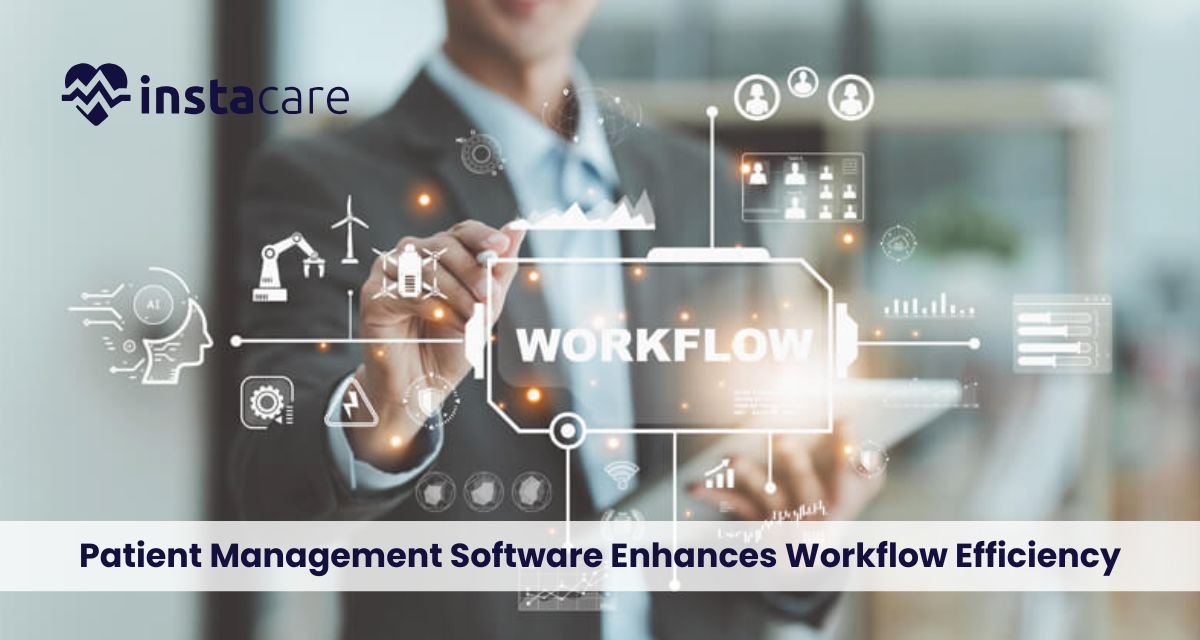Last updated on Wednesday, 23, October, 2024
Efficiency is something the developing healthcare landscape is ever on the lookout for. The evolution of PMS or patient management software has been considered an extremely vital tool for healthcare providers in maximizing the efficiency of workflow, hence providing improved patient care.
This report outlines how patient management software maximizes the operations of a healthcare delivery system by making even the smallest aspects-from scheduling appointments to billing contributions to better patient outcomes and smoother handling of patient management processes across the board.
Electronic patient management software manages patient data, scheduling, billing, and communication. PMS simplifies routine patient information management and promotion of healthcare delivery. The patients and connections with a healthcare provider are improved through coordination and communication among administrative staff, patients, and providers using these systems that feature health care.
Table of Contents
1-Streamlined Scheduling Process
Automated Scheduling
Another significant role that patient management software plays is automation of appointment scheduling, which often proves to be one of the most painful and laborious exercise when using traditional methods involving manual entry and phone calls which often give room for a lot of errors. Through the patient management system, you can easily automate the process of appointment scheduling by allocating time slots when a clinician is available, thus greatly reducing the chances of getting double-booked and missing appointments.
Patient Self-Scheduling
In many PMS solutions, patients are provided with access to patient portals that allow them to self-book, reschedule, or cancel appointments. This self-service mechanism, apart from empowering patients, saves staff time so that administrative personnel can be assigned to more important work. Administrative burden reduction will stream-line workflows and ensure patients’ satisfaction.
Reminders and Notifications
True game changers for no-show and last-minute cancellations are automated reminders via e-mail or SMS. Patient reminders will help the PMS ensure maximum provider schedules and minimal lost revenues in terms of time slot utilization.
2-Centralized Information of Patients
Complete Records
Easy access to relevant information pertaining to a patient is the foundation of effective patient management. The patient management software brings all relevant information together and makes them readily accessible to health professionals. They include history, medications, allergies, laboratory test results, and treatment plans. Everything is kept in one place, and providers can make decisions quickly during consultation.
Interoperability
Modern PMS solutions are nowadays connected to other health systems. They allow for seamless data interchange between laboratories, pharmacies, and specialists. These links allow for coordinated care, reduced errors, and easier reviews of lab results on a patient’s record. As quickly as these lab results update on a patient’s account, providers can view them in real-time for rapid treatment decisions.
3-Better Communication
System Internal Communications
Effective communication is an important need in the healthcare sector. As discussed earlier, patient management software supports internal communication by way of secure message systems that make the staff to converse instantly and easily. Thus, reliance on telephone calls and emails is reduced, decision making is faster, and teamwork is improved.
Patient Communication
PMS offers direct communication with patients through either portals or messaging features. Test results, reminders of appointments, and educative material can be forwarded directly to the patient by providers, hence increasing engagement levels. When the patient feels informed and involved in the treatment process, then compliance and satisfaction improve.
Coordination with Specialists
In healthcare, referrals to specialists are commonplace. PMS makes communication between the primary care and specialty providers easy, thereby ensuring that everyone involved in the treatment of the patient knows about the treatment plan and condition of the patient, improving the outcomes.
Shared access to records of patients will enable specialists to have access histories and thus provide informed decisions, enhancing more coordinated and comprehensive care.
4-Improved Billing and Insurance Processing
Automated Billing
Billing very often is one of the most time-consuming aspects of healthcare management. Patient management software makes billing tasks automated; hence, it streamlines this aspect as well. After a visit, PMS can automatically make invoices so that the charges will be correctly calculated based on services rendered. It avoids errors due to manual entry and accelerates the billing cycle, thus improving cash flow for healthcare practices.
Insurance Verification
Most PMS packages have real-time insurance eligibility verification. This helps avoid billing errors as the coverage of services is checked before the patient comes in for an appointment. Fast verification cuts down on the claims denials of the practice and thus the financial stability of the practice.
Claims Management
PMS typically allows electronic submission of insurance claims and enables tracking of the status and denials for a practice to effectively manage the revenue cycle. This automatically makes the practice aware of its financial health and capacity to collect claims in an efficient manner.
Prompt claims resolution will ensure that the service providers are reimbursed by payers within the committed timelines.
5-Data Analytics and Reporting
Performance Tracking
This patient management software provide both analytics and reporting capabilities to offer rich data insights. The providers are able to track any of the KPIs, for instance, patient wait times, appointment volumes, and even the productivity level of employees. All this information helps to point out areas of improvement and thus informs operations-related strategies.
Clinical Outcomes
By analyzing the effectiveness and improvement in treatments, patient outcomes become possible. Based on proven evidence, care protocols can be changed by providers regarding the care of patients.
Data analytics helps better understand trends and patterns concerning patient care, allowing providers to alter their practices based on evidence-based insights.
Financial Reporting
PMS generates financial reports showing practice revenues and expenditures, so the practice will know where its revenues come from and thus determine its financial health. Budget planning and resource allocation are easy to plan because practices can operate with sustainability, thereby providing high-quality care.
6-Improved Patient Experience
Online Portals
A positive patient experience is a key to healthcare success. The management of patients forms part of this since it enables the access to their health information and ability to schedule appointments online as well as communicate with providers through the online portal. This, therefore, empowers the patients and increases participation, which implies high satisfactions.
Personalized Care
This brings providers closer to their patients, giving them full patient information for the ultimate aim of designing and offering tailored treatment strategies to meet each patient’s needs. Personalized care increases patient satisfaction and improves adherence to plans proposed for treatment, leading generally to better health outcomes for patients.
Feedback Mechanisms
Most PMS solutions provide facilities for collecting patient feedback; this allows practices to discover problem areas and therefore improve services. Healthcare providers show a high level of interest in continuous improvement and patient-centered care by actively soliciting and engaging with patient feedback.
7-Compliance and Security
Automated Documentation
Any healthcare organization should maintain compliance with regulatory healthcare-related data. Patient software helps in the preparation of the required documents needed for compliance under law. All such records maintained through such software are accurate. It has reduced administrative work and has motivated the staff to comply with the standards under the law.
Data Security
It protects patients’ data against intrusion via robust security measures, such as encryption and access controls. Its implementations could ensure its HIPAA and other regulations compliance. Sensitive information in healthcare would be ensured secure through robust security protocols as embodied by healthcare providers, which ensures the continued trust of patients.
Audit Trails
Most systems have audit trails for tracking access to patient records, thus encouraging accountability and transparency. The logs enable organizations to track who accessed data and at what time so that any unauthorized access can be noticed and dealt with promptly.
8-Customization and Scalability
Tailored Features
Because every healthcare organization is different, patient management software can often be tailored to meet those needs. With many PMS solutions, practices are able to configure features and workflows that exactly fit the needs of their unique processes, making it easier to use and more effective.
Scalability
The increasing practices can scale out the patient management software to offer care to more patients and more services without the need to change the whole system in its entirety. This enables health care organizations to expand with continued efficient operations.
Conclusion
Patient management software can have a positive impact on the workflow of healthcare providers in improving the efficiency of workflow within healthcare organizations. Such systems help streamline the scheduling of appointments, centralize patient information, improve communication, and expedite the billing process, which will leave providers to focus more on how they care for their patients and less on time-wasting administrative tasks. Added to that is the element of data analytics and reporting that aid healthcare providers to make informed decisions, which will therefore lead to better patient outcomes and satisfaction.
This implies that beyond adopting something new, a patient management software investment represents a full revolution in the performance of health care organizations. The adoption of digital solutions by healthcare organizations brought with it a drastic increase in efficiency, compliance, and overall experience of the patients thus creating better quality care.
FAQs
What is patient management software?
Patient Management Software: This is a digital solution for the management of patients. It involves managing patient information, booking appointments, billing, and communication, all through one source for convenience and efficiency. All the more important benefit of use is that all data centralized, which makes it easy and streamlined in operations to work on care for the patients.
How does Patient Management Software Enhance Efficiency in Workflow?
PMS enhances workflow efficiency by automating many tasks such as scheduling, billing, centralizing patient information, improving communication, providing data analytics, among others. This allows healthcare providers to spend more time on patient care.
Is patient management software secure?
Yes. Recognized patient management software solutions have strong security methods applied, including encryption and adherence to regulations of healthcare practices such as HIPAA, which ensures that confidentiality and safety of patients’ information are achieved.



